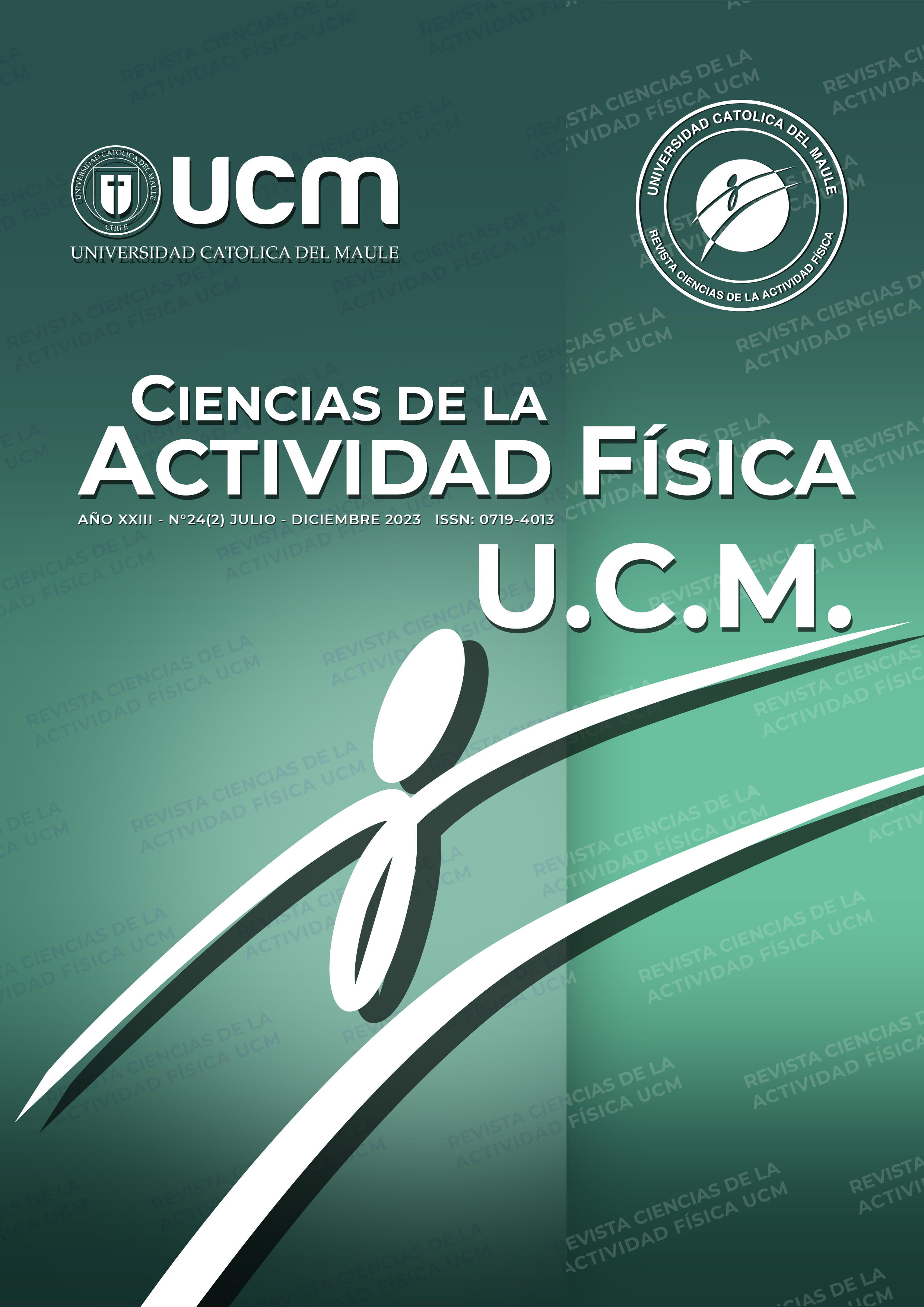Rendimiento en los Juegos Panamericanos de Santiago 2023 Predicción mediante método de suavización exponencial simple
Contenido principal del artículo
Resumen
Detalles del artículo
Aguayo, E., Mena, L. & Lavarello, R. (2004). Un modelo predictivo para el logro del rendimiento deportivo superior. efdeportes.com, (73). https://www.efdeportes.com/efd73/rendim.htm
Aguilera Aguilera, J. R. (2009). Fundamentos de producción para licenciados en contaduría [Tesis de doctorado, Universidad Michoacana de San Nicolas de Hidalgo]. https://www.fcca.umich.mx/doctorado/Descarga/Tesis/T6.pdf
Anholt, S. (2003). Branding places and nations. En R. Clifton & J. Simmons (Ed.), Brands and Branding (pp. 213-226). Bloomberg Press.
Araripe, A., Palao, J., Marcelino, R. & Mesquita, I. (2014). Revisão sistemática sobre a performance desportiva no voleibol de praia a partir da análise do jogo. Revista Brasileira de Cineantropometria e Desempenho Humano, 16(6), 698-708. https://doi.org/10.5007/1980-0037.2014v16n6p698
Boweman, B., O’Connell, R., & Coehler, A. (2007). Pronósticos, series de tiempo y regresión: un enfoque aplicado. Cengage Learning.
Brown, R. (1959). Statistical forecasting for inventory control. McGrww-Hill.
Brown, R. (1963). Smoothing, forecasting and prediction of discrete time series. Prentice-Hall.
Carvalho, M. J., Ferreira, J., Sousa, M., & Paipe, G. (2023). Las ciudades deportivas europeas en la región norte de Portugal: implicaciones para el desarrollo del deporte local sport. Retos, 47, 978–985. https://doi.org/10.47197/retos.v47.95053
Chalkley, B., & Essex, S. (1999). Urban development through hosting international events: a history of the Olympic Games. Planning Perspectives, 14(4), 369-394. https://doi.org/10.1080/026654399364184
Clarke, S. (2011). Rating non-elite tennis players using team doubles competition results. Journal of the Operational Research Society, 62(7), 1385-1390. https://doi.org/10.1057/jors.2010.75
Coyne, J., Coutts, A., Newton, R. & Haff, G. (2021). Training Load, Heart Rate Variability, Direct Current Potential and Elite Long Jump Performance Prior and during the 2016 Olympic Games. Journal of Sports Science & Medicine, (20), 482-491. https://doi.org/10.52082/jssm.2021.482
De Bosscher, V., De Knop, P., Van Bottenburg, M., Shibli, S. (2007). A Conceptual Framework for Analysing Sports Policy Factors Leading to International Sporting Success. European Sport Management Quarterly, 6(2), 185-215, https://doi.org/10.1080/16184740600955087
Duclos-Bastías, D., Parra-Camacho, D., Giakoni-Ramírez, F., Ulloa- Hernández, M. & Sánchez, J. (2023). Intenciones futuras de los residentes sobre la celebración la Fórmula E en Santiago de Chile. SPORT TK-Revista EuroAmericana de Ciencias del Deporte, 12, 1. https://doi.org/10.6018/sportk.497831
Espinoza, B. & Grigoletto, A. (2020). El impacto económico que genera ser anfitrión de los Juegos Panamericanos [Tesis de grado, Universidad Peruana de Ciencias Aplicadas]. https://repositorioacademico.upc.edu.pe/handle/10757/653609
Fernández Ortega, J. A., Rodríguez Buitrago, J. A., & Sánchez Rodriguez, D. A. (2021). Aspectos centrales de la identificación y desarrollo de talentos deportivos: revisión sistemática. Retos, 39, 915–928. https://doi.org/10.47197/retos.v0i39.79323
Flández-Valderrama, J., Gargallo-Bayo, P., González-Orb, M., Cornejo-Améstica, M., Parraguez, V. J., Aguilar-Navarrete, J., & Colado, J. (2022). Chile’s social outburst: Major arguments and demands by athletes, coaches, and leaders of the Chilean Olympic Movement. Journal of Human Sport and Exercise, 18(2), 317-335. https://doi.org/10.14198/jhse.2023.182.04
Goodwin, P. (2010). The Holt-Winter approach to exponential smoothing: 50 years old and going strong. Foresight: The International Journal of Applied Forecasting, 19, 30–33. https://www.scirp.org/%28S%28vtj3fa45qm1ean45vvffcz55%29%29/reference/referencespapers.aspx?referenceid=2799175
Heinemann, K. (2008). Introducción a la metodología de la investigación empírica en las ciencias del deporte. Paidotribo.
Hernández-Sampieri, R. & Mendoza, C. (2018). Metodología de la investigación: la ruta cuantitativa, cualitativa y mixta. McGraw Hill.
Hughes, K., Kirk, D., & Long, J. (2010). El Legado Social de los macro-eventos deportivos y los juegos olímpicos y paralímpicos de Londres 2012. Citus, Altius, Fortius: Humanismo, sociedad y deporte. Investigaciones y ensayos, 3(1), 19-38. https://strathprints.strath.ac.uk/49586/
Jacques, V., Flández, J., Monrroy, M., Arismendi, A., Vergara, G., Maureira, F., Vargas, R., Cornejo, M., Martínez, C. & Gajardo, R. (2016). Factores determinantes del desempeño de los deportistas en Chile. El caso de los deportistas de alto rendimiento. Motricidade, 12(S2), 165-174. https://repositorioslatinoamericanos.uchile.cl/handle/2250/3031915
Kuper, G. & Sterken, E. (2012). Forecasts and evaluation of the 2011 Pan American Games. EconoQuantum, 9(2), 45-60. https://doi.org/10.18381/eq.v9i2.148
Llopis-Goig, R. (2012). Megaeventos Deportivos: Perspectivas Científicas y Estudios de Caso. UOC.
Machado, D. (2018). Perspectiva del concepto de calidad en la Educación Superior en América Latina. Revista Navarra Jurídica, 2(1), 54-74. https://journals.uninavarra.edu.co/index.php/navarrajuridica/article/view/a3-v2-n1-2018
McLeroy, K., Bibeau, D., Steckler, A. & Glanz, K. (1988). An ecological perspective on health promotiong programs. Health Education Quarterly, 15(4), 351-377. https://doi.org/10.1177/109019818801500401
Olderr, A. (2003). The Pan American Games: A Statistical History / Los Juegos Panamericanos: una historia estadística, 1951-1999. McFarland.
Organización de Naciones Unidas. (2015). Objetivos de Desarrollo Sostenible. https://www.un.org/es/impacto-acad%C3%A9mico/page/objetivos-de-desarrollo-sostenible
Preuss, H., & Solberg, H. (2006). Attracting major sporting events: The role of local residents. European Sports Management Quarterly, 6(4), 391-411. https://doi.org/10.1080/16184740601154524
Roche, M. (1994), Mega-events and urban policy. Annals of Tourism Research, 21(1), 1-19. https://doi.org/10.1016/0160-7383(94)90002-7
Smith, A. (2009). Theorising the Relationship between Major Sport Events and Social Sustainability. Journal of Sport & Tourism, 14(2-3), 109-120. https://doi.org/10.1080/14775080902965033
Taks, M. (2013). Social sustainability of non-mega sport events in a global world. European Journal for Sport and Society, 10(2), 121-141. https://doi.org/10.1080/16138171.2013.11687915
Tejero-González, C. (2016). Sobre la importancia del deporte como acción política: Razones y medidas de Gobernanza. Cultura, Ciencia y Deporte, 11(31), 5-6. https://doi.org/10.12800/ccd.v11i31.637
Widmark, E., & Holmgren, J. (2017). The Impact of Internal Values on the Sports Sponsorship Market. A qualitative study of how large companies work on their internal values and motivate their sponsorship programs [Tesis de bachillerato, University of Gothenburg]. https://gupea.ub.gu.se/bitstream/handle/2077/55181/gupea_2077_55181_1.pdf?sequence=1&isAllowed=y

Esta obra está bajo una licencia de Creative Commons Reconocimiento-NoComercial-CompartirIgual 4.0 Internacional


